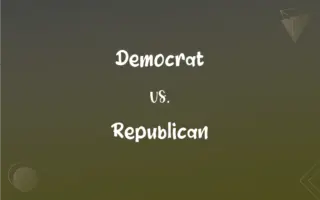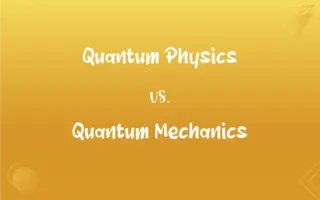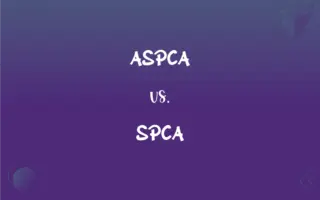Noun vs. Pronoun: What's the Difference?
Edited by Janet White || By Harlon Moss || Updated on October 9, 2023
A noun names a person, place, thing, or idea (e.g., dog). A pronoun replaces a noun to avoid repetition (e.g., it).

Key Differences
A noun is the fundamental building block of a sentence, serving as the subject or object, while a pronoun steps in to maintain coherence without repetition. Nouns like 'city' or 'computer' convey direct meaning, whereas pronouns like 'she' or 'they' derive meaning from preceding nouns.
Considering syntax, nouns generally require an article in English, while pronouns do not. A noun may appear as 'a cat' or 'the city', contrasting with pronouns which stand alone, as in 'he runs' or 'it falls', showcasing differing structural roles.
In terms of variety, nouns come in various forms, such as common, proper, countable, and uncountable. Pronouns, on the other hand, appear in varied forms too, like personal, possessive, reflexive, and relative, each serving distinct purposes within sentences.
The inflection of nouns and pronouns also differs. Nouns can exhibit number (singular/plural) and occasionally gender. Pronouns distinctly inflect for gender (he/she/they), number (it/they), and case (him/her/them), modifying their form based on sentence role.
While nouns often provide specificity and detail in descriptions, giving concrete or abstract images, pronouns generally allow for smoother and more efficient communication by reducing redundancy, ensuring sentences like “The dog is big. It is furry” aren’t overly repetitive.
ADVERTISEMENT
Comparison Chart
Definition
Names entities
Replaces nouns
Example
Dog, city
He, she, it
Requirement of Article
Often requires
Doesn't require
Forms
Common, proper, etc
Personal, relative, etc
Inflection
Shows number, some gender
Reflects gender, number, case
ADVERTISEMENT
Noun and Pronoun Definitions
Noun
A noun can name a physical entity.
The book is on the table.
Pronoun
Pronouns can substitute for nouns.
She is my best friend.
Noun
A noun can indicate places.
Paris is a vibrant city.
Pronoun
A pronoun might indicate possession.
This book is mine.
Noun
Nouns might denote abstract concepts.
Happiness can be fleeting.
Pronoun
Pronouns can be reflexive, emphasizing a noun or pronoun.
He cut himself.
Noun
Nouns can represent a collective group.
The team practiced diligently.
Pronoun
Pronouns can stand in for objects.
We saw them at the party.
Noun
Nouns might also name events.
The concert was exhilarating.
Pronoun
A pronoun might relate a subordinate clause to a main clause.
This is the book that I borrowed.
Noun
The part of speech that is used to name a person, place, thing, quality, or action and can function as the subject or object of a verb, the object of a preposition, or an appositive.
Pronoun
The part of speech that substitutes for nouns or noun phrases and designates persons or things asked for, previously specified, or understood from the context.
Noun
Any of the words belonging to this part of speech, such as neighbor, window, happiness, or negotiation.
Pronoun
Any of the words within this part of speech, such as he or whom.
FAQs
Can a word be both a noun and a pronoun?
No, a word is either a noun or a pronoun, not both.
How do I use pronouns correctly in sentences?
Ensure the pronoun’s antecedent (the noun it replaces) is clear and that the pronoun agrees in number and gender.
What is a proper noun?
A proper noun is a specific name for a particular person, place, or thing, like "London" or "Shakespeare."
What is a collective noun?
A collective noun names a group of people or things treated as a single unit, like "team" or "flock."
Are all nouns replaceable by pronouns?
Most nouns can be replaced by a pronoun, depending on context.
Are there plural forms of pronouns?
Yes, examples include they/them/their.
Can a sentence begin with a pronoun?
Yes, a sentence can start with a pronoun, e.g., “He is walking.”
What’s an example of a personal pronoun?
“She” is a personal pronoun, substituting for a female noun.
What is a common noun?
A common noun is a general name for any person, place, thing, or idea, like "city" or "dog."
Why use pronouns instead of repeating nouns?
Pronouns avoid redundancy and make sentences smoother, e.g., “Anna said Anna lost Anna’s hat” vs. “Anna said she lost her hat.”
Can a noun be an adjective?
Sometimes. In compound nouns, the first noun can act like an adjective to describe the second, as in “race car.”
Are there rules for making nouns plural?
Yes, e.g., most nouns add "-s" (cats), but there are irregular forms (children) and unchanged forms (deer).
Can proper nouns be replaced by pronouns?
Yes, e.g., “New York is big. It is also populous.”
What is a noun?
A noun is a word that names a person, place, thing, or idea.
Can a noun function as an object?
Yes, a noun can be an object, e.g., “She reads a book.”
What is an abstract noun?
An abstract noun names an idea, quality, or state rather than a concrete object, like "freedom" or "joy."
What is a reflexive pronoun?
Reflexive pronouns refer back to the subject of the clause in which they are used, like "himself" or "itself."
What are relative pronouns?
Relative pronouns, like "who" or "which," introduce relative clauses, providing more information about a noun.
What’s a demonstrative pronoun?
A demonstrative pronoun points to and identifies a noun or a pronoun, like "this" or "those."
Can a pronoun stand alone without an antecedent?
Generally, no. Pronouns typically need an antecedent for clarity unless the context is very clear.
About Author
Written by
Harlon MossHarlon is a seasoned quality moderator and accomplished content writer for Difference Wiki. An alumnus of the prestigious University of California, he earned his degree in Computer Science. Leveraging his academic background, Harlon brings a meticulous and informed perspective to his work, ensuring content accuracy and excellence.
Edited by
Janet WhiteJanet White has been an esteemed writer and blogger for Difference Wiki. Holding a Master's degree in Science and Medical Journalism from the prestigious Boston University, she has consistently demonstrated her expertise and passion for her field. When she's not immersed in her work, Janet relishes her time exercising, delving into a good book, and cherishing moments with friends and family.






































































